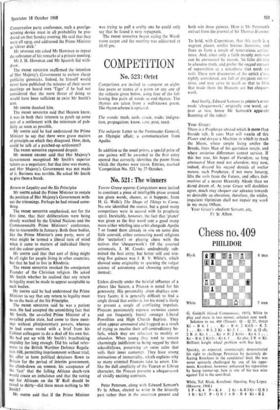No. 521: The winners
Trevor Grove reports: Competitors were invited to construct a piece of intelligible prose around ten given words, chosen, as it happens, from H. G. Wells's The Shape of Things to Come. No one identified the source, but a good many competitors were in accord with its prophetic spirit. Inevitably, however, the fact that 'planet' was given as the first word sent a good many more either whirling into orbit alongside Apollo 7 or found them already in situ on some dim little asteroid, either concocting novel religions (for 'sectarian') or playing chess with the natives (for `chequerwork). Of the assorted astronauts, J. M. Crooks undoubtedly sub- mitted the best entry, but better still and win- ning five guineas was J. R. V. White's, which showed some originality in spurning the vulgar science of astronomy and choosing astrology instead: Unless directly under the baleful influence of a planet like Saturn, a Piscean is noted for his generosity. His personality often displays con- trary facets; it is generally difficult to find a single thread that unifies it, for his mind is likely to present a tangle of conflicting impulses. Pisceans passionately espouse sectarian causes and are frequently found amongst Liberal Powellites and High Church Baptists. They often appear attenuated and haggard as a result of trying to resolve their self-contradictory be- liefs, which they are reluctant to modify or abandon. When young they tend to remain charmingly indifferent to being ragged by their schoolfellows, preserving an outer calm that veils their inner contempt. They have strong intimations of immortality, which explains why so many criminal Pisceans take to arson. Un- like the dull simplicity of the Tauran or Libran character, the Piscean presents a chequerwork of vividly exciting contrasts.
Peter Peterson, along with Edward Samson's Fr St Alban, elected to write in the leisurely past rather than in the uncertain present and both win three guineas. Here is Mr Peterson's extract from the journal of Sir Thomas Browne: To hold, with Copernicus, that this earth is a vagrant planet, unifies bivious theorems, and frees us from a tangle of temerarious cor..jec- tures. And, since only a faith meanly sectarian can be attenuated by reason, 'tis false divinity to abandon truth, and prefer the ragged centues of superstition to a nakedness that needs no
veils. These new discoveries of the optick g!ass, rightly considered, are full of pregnant intona- tions, and may serve to teach us that to Him that made them the Heavens are but chequer- work.
And finally, Edward Samson (a printer's error made 'chequerwork,' originally one word, ap- pear as two, hence Mr Samson's apparent flaunting of the rules): Your Grace:
There is a Prophesye abroad which is more than fireside talk. It saies Man will wearie of this Planet and devyse a Machine in which to reach the Moon, where simple living unifies the Breeds, frees Man of his quotidian tangle, and where sectarian differences cannot survive. If this bee true, his hopes of Paradyse, so long attenuated Man need not abandon; may now, indeed, discard his raved denials of melior natura, such Prophesye, if not mere lunarcy, lifts the veils from the Future, and offers Intl- mations of a nearer Heavenly Abode than we dared dream of. As your Grace will doubtless agree, much may chequer our advance towards so desirable an elevation, therefore, the whiles, impatient Optimism shall not impair my work in my many Offices.
Your Grace's obedient Servant, etc, Fr St Alban.






































 Previous page
Previous page